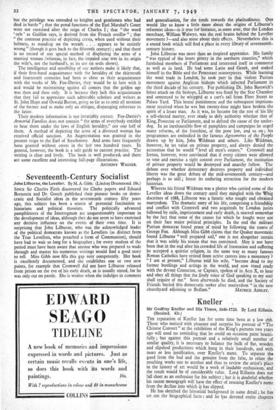Seventeenth-Century Socialist
John Lilburne, the Leveller. By M. A. Gibb. (Lindsay Drummond. 18s.) SINCE Sir Charles Firth discovered the Clarke papers and Eduard Bernstein and Dr. Gooch published their pioneer books on demo- cratic and Socialist ideas in the seventeenth century fifty years ago, this subject has been a source of perennial fascination to historians and political theorists. The politically advanced pamphleteers of the Interregnum are unquestionably important in the development of ideas, although they do not seem to have-exercised any decisive influence on the events of their- own time. It is surprising that John Lilburne; who was the acknowledged leader of the political democrats known as the Levellers (as distinct front the True Levellers, who preached a form of Communism), should have had to wait so long for a biographer ; for every student of the period must have been aware that anyone who was prepared to wade through and master his numerous writings would find a good story to tell. Miss Gibb now fills this gap very competently. Her book is excellently documented, and she establishes one or two new points, for example that Cromwell did not have Lilburne released from prison on the eve of his early death, as is usually stated, for he was only out on parole. She is weaker when she indulges in comment
and generalisation, for she tends towards the platitudinous. One would like to know a little more about the origins of Lilburne's reformist ideas—is it true for instance, as some aver, that the London merchant, William. Welwyn, was the real brains behind the Leveller movement 2—and also more about their effects. Nevertheless this is a sound book which will find a place in every library of seventeenth- century history. .
John Lilburne was more than an inspired apprentice. His family "was typical of the lesser gentry in the northern counties," which furnished members of Parliament and interested itself in commerce as well as in land. He had some Latin and Greek, and soaked himself in the Bible and the Protestant masterpieces. While learning the wool trade in London; be took part in that violent Puritan movement against Anglican bishops 'which infected Parliament in the third decade-olf his century. For publishing Di. John Bastwick's bitter attack on the bishops, Lilburne was fined by the Star Chamber and sentenced to be whipped at a cart's tail from Fleet Street to Palace Yard. This brutal punishment and the subsequent imprison- ment received when he was but twenty-four might have broken-the spirit of a lesser man. As it was, he became for the rest of his life a self-elected martyr, ever ready to defy authority whether that of King, Protector or Parliament, and to defend the cause of the under- dog.' In an inexhaustible flow of pamphlets and campaigns he urged many reforms, of the franchise, of the poor law, and so on.; his programmes are embodied in the famous Agreements of the People drawn up by him, John Wildman and others. Like • Wildman, however, he set value on private property, and always denied the accusation that he would "level all men's estates." Cromviell and Ireton, however, were convinced that if every citizen were allowed to vote and exercise a tight control over Parliament, the institution of private property would be destroyed and anarchy follow. The debate over whether democracy destroys property and individual liberty was the great debate of the mid-seventeenth century—and perhaps is so still ; hence its enduring attraction for the modern historian.
Whereas his friend Wildman was a plotter who carried some of the Leveller ideas down the century , until they mingled with the Whig doctrines of x688, Lilburne was a fanatic who sought and obtained martyrdom. The dramatic story of his life, comprising alriendship and conflict with Cromwell and two acquittals by London juries followed by exile, imprisonment and early death, is marred somewhat by-the fact that some of the causes for which he fought were not on their face major political principles. In the end the militant Puritan democrat found peace of mind by following the tenets of George Fox. Although Miss Gibb claims that the Quaker movement found Lilburne "well prepared soil," one is not altogether certain that it was solely his reason that was convinced. May it not have been that in the end after his crowded life of frustration and suffering he accepted a quietist religion, in the same way as many famous Roman Catholics have retired from active careers into a monastery ? " I am at present," Lilburne told his wife, " become dead to my former bustlings and actings in the world, and now stand ready with the devout Centurion, or Captain, spoken of in.Acts X, to hear and obey all things that the lively voice of God speaking to my soul shall require of me." Soon afterwards he died, and the Society of Friends buried this democratic seeker after martyrdom " in the new churchyard adjoining to Bedlam." .MAIIRICE ASHLEY.






































 Previous page
Previous page